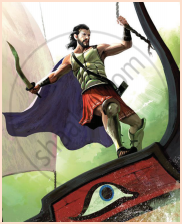Advertisements
Advertisements
Question
Introduction
The poem ‘Ulysses’ is a dramatic monologue that contains 70 lines of blank verse. Ulysses, the King of Ithaca, gathers his men together to prepare for the journey and exhorts them not to waste their time left on earth. Ulysses has grown old, having experienced many adventures at the battle of Troy and in the seas. After returning to Ithaca, he desires to embark upon his next voyage. His inquisitive spirit is always looking forward to more and more of such adventures.

Solution
The poem can be divided into three parts
- the thirst for adventure, which does not allow Ulysses to remain in his kingdom as a mere ruler;
- Ulysses handing over the responsibility to his son Telemachus, with total confidence in his abilities;
- Ulysses’ clarion calls to his sailors, urging them to venture into unknown lands.
APPEARS IN
RELATED QUESTIONS
Have you ever visited a fort or a castle?
Fill in the following empty boxes.
| Name | Location |
| Fort St. George | Chennai |
| Gingee Fort | ______ |
| Golconda Fort | ______ |
| Red Fort | ______ |
Why were the soldiers in the castle fearless?
Who had let the enemies in?
Why were the secret galleries bare?
What was the ‘shameful act’?
Read the given line and answer the question that follow in a line or two.
A foothold there, no clever trick
Could take us dead or quick,
Only a bird could have got in.
- What was challenging?
- Which aspect of the castle’s strength is conveyed by the above line?
Our only enemy was gold
Underline the alliterated word in the following line.
A little wicked wicket gate.
Describe the garden during the night.
How does the poet spend her winter?
Read the line given below and answer the question that follow.
A creeper climbs, in whose embraces bound No other tree could live.
- Which tree is referred to in the above lines?
- How does the tree survive the tight hold of the creeper?
- Why does Toru Dutt use the expression ‘a creeper climbs’?
Identify the figure of speech used in each of the extract given below and write down the answer in the space given below.
“The water-lilies spring, like snow enmassed.”
Identify the figure of speech used in each of the extract given below and write down the answer in the space given below.
“ What is that dirge-like murmur that I hear Like the sea breaking on a shingle -beach?
Describe the second stage of life as depicted by Shakespeare.
Read the given line and answer the question that follow.
And then the justice,
In fair round belly with good capon lin'd,
With eyes severe and beard of formal cut,
Full of wise saws and modern instances;
- Whom does justice refer to?
- Describe his appearance.
- How does he behave with the people around him?
- What does he do to show his wisdom?
‘Ulysses is not happy to perform his duties as a king.’ Why?
Who does the speaker address in the second part?
Identify the figure of speech employed in the following line.
.....the deep Moans round with many voices.
List the roles and responsibilities Ulysses assigns to his son Telemachus, while he is away.
What happened to the people who wanted too much money?
What has twisted good men into thwarted worms?
Why does the poet advise his son to have lazy days?
Who do you think is the narrator of the poem?
Where was the narrator when the incident happened?
What was Napoleon’s reaction on hearing the news of victory?
Literary Devices
Mark the rhyme scheme of the poem. The rhyme scheme for the first stanza is as follows.
| With neck out-thrust, you fancy how, | a |
| Legs wide, arms locked behind, | b |
| As if to balance the prone brow | a |
| Oppressive with its mind. | b |
What is the role of the young soldier in the victory of the French at Ratisbon?
Napoleon was a great source of inspiration to his army. Justify.
